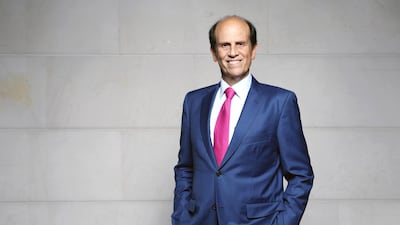In a year when billionaires are hot political targets, and Wall Street leaders openly worry about the future of capitalism, many are about to take refuge among friends in sunny California.
Buyout titans, bankers, politicians, entertainment moguls and even professional athletes are among hundreds set to gather at the Milken Global Conference in Los Angeles on Sunday. With democratic socialists propelling the national news and presidential candidates debating how much more to tax the rich, the event has adopted a theme that touches on those concerns: “Driving shared prosperity.”
But for many attendees, the main purpose is still purely business. Some prominent Milken-goers said they prefer the Los Angeles conference to the World Economic Forum in Davos, Switzerland, because it attracts more giants of industry looking to do deals rather than talking about ways to change the world.
“In Davos, you’re much more inclined to be subject to the whims of the globe,” says Eric Cantor, the former House majority leader now at boutique investment bank Moelis & Co. Milken “is much more of a gathering of people who are seriously looking to deploy capital", he adds.
Ticket perks
Just attending is something of an investment. Tickets start at $15,000 (Dh55,100) and can run three times that amount, depending on seating and other perks, such as use of an executive lounge.
“I have at least seven bankers in addition to myself coming,” says Mark Fedorcik, co-president of Deutsche Bank’s investment bank. He hosts an annual dinner where dozens of major clients typically catch a glimpse of Michael Milken, the event’s founder. Mr Fedorcik said he made contacts at past conferences who have repeatedly brought deals to his bank. “Yes, it is about business.”
The bash lures an unusual concentration of wealth. At least 11 speakers on the agenda are listed on the Bloomberg Billionaires Index, with a combined net worth exceeding $100 billion. Among them are Apollo Global Management’s Leon Black, Blackstone Group’s Steve Schwarzman and Colony Capital’s Tom Barrack. And that doesn’t count the audience, where people with 10 figures in their net worth can roam discreetly.
Bank leaders including Goldman Sachs Group chief executive David Solomon and Wells Fargo chief financial officer John Shrewsberry also are slated to speak. Some of their biggest clients may be in the room.
Financial think-tank
Rich Ditizio, president of the Milken Institute, says that attendees including representatives from pension giants and sovereign wealth funds control about $23 trillion in capital. Milken has become “a financial think tank” that weaves together industries and topics, he said.
“I’ve been to Davos, all of the others, and they are good,” Mr Ditizio says. “But often you can go to a finance or media conference and be a little bit captive to their silo. At Milken, you really appreciate how interrelated these themes are.”
Mr Black and Mr Solomon are just a few Wall Street leaders attending who began their careers at Drexel Burnham Lambert, the firm once run by Michael Milken before he pleaded guilty to violating securities laws. The Milken conference is at the Beverly Hilton Hotel, where the junk-bond king used to hold an annual gathering, widely known as the Predators’ Ball, for investors looking to bet on distressed companies. He’s spent more recent decades focusing on philanthropy - funding medical research and charities.
“There is a pretty extraordinary assembly of people who used to work for Mike in some way,” Mr Ditizio says. “It was such a long time ago. I look at some of my staff here, they weren’t even born.”
Socialism’s rise
This year, there are signs that cultural and political winds in the US are shifting against the country’s richest, as well as big banks and other industries.
Socialism is gaining popularity, particularly with young Americans. A Gallup poll in August found that 51 per cent of people age 18 to 29 have a positive view of the more liberal economic approach, associating it with European democracies guaranteeing health care and paid leave. Capitalism’s popularity slumped to 47 per cent in that age group - down from 68 per cent in 2010.
Last year’s election featured the ascent of progressives such as New York Representative Alexandria Ocasio-Cortez, who have since shifted the debate on environment regulation and social programmes with a “Green New Deal.” Heading into next year’s presidential race, Senator Elizabeth Warren is pushing an annual tax on wealth exceeding $50m.
This month, seven bank CEOs including Mr Solomon were called to a hearing on Capitol Hill, fielding questions about pay disparity, gender equality and a wide variety of business dealings, such as services for gun manufacturers and oil companies.
Now, Milken-goers are concerned about what might come from Washington next, says Mr Cantor. They don’t want the government to interfere with free markets, he adds.
To be sure, there are do-gooder events at Milken, such as sessions on sustainable investing, health care, student debt and a hot new tax break to help struggling communities, dubbed opportunity zones. Yet, several sessions on the tax perk are labeled “invite only,” including a panel with US officials helping implement the policy. The measure, part of a broad overhaul President Donald Trump’s administration pushed through in December 2017, is proving controversial, with skeptics concerned it may help the rich more than the poor.
A number of figures from the Trump administration will be present. Mick Mulvaney, the White House’s acting chief of staff, is scheduled to share his view of the economy. And Mr Trump’s daughter, Ivanka Trump, was added days ago to the roster of attendees. Last year, vice president Mike Pence joined Colony’s Barrack in a closed-door, fireside chat and later attended a $10,000-per-person fundraiser that included Treasury Secretary Steven Mnuchin.
Landing a deal
It’s places like these that deals get started. Tom Amster, the Los Angeles-based head of US. financial sponsors at Macquarie Capital who’s attended Milken for more than a decade, said he, too, generates business from meetings there.
Mr Amster, formerly a managing director at Morgan Stanley and Goldman Sachs Group, worked on the $650m sale of EmbanetCompass to Pearson in 2012, a mandate that he landed at Milken that year. EmbanetCompass had been owned by Knowledge Universe, co-founded by Michael Milken, and Technology Crossover Ventures.
“This conference is a place that business gets done because finance is at its core,” Mr Amster says. “It gets more and more crowded each year.”




